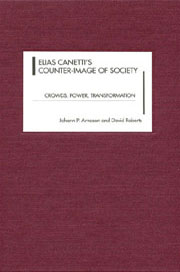4 - Canetti's Counter-Image of Society
Published online by Cambridge University Press: 05 February 2013
Summary
It could be conceivable that society is not an organism, that it has no structure, that it functions only temporarily or seemingly. The most obvious analogies are not the best.
— The Human ProvinceTrue, he [man] wants to “preserve” himself, but he also simultaneously wants other things which are inseparable from this.
— Crowds and PowerThe planning nature of man is a very late addition that violates his essential, his transforming nature.
— The Secret Heart of the ClockMan, regarding himself as the measure of all things, is almost unknown. His progress in self-knowledge is minimal, every new theory obscures more of him than it illuminates.
— The Conscience of WordsThe strange case of canetti's Crowds and Power — widely recognized as a key work of a major writer, but virtually ignored as a contribution to social theory — can only be explained in the context of a more general discursive blockage. There is no denying that Canetti's image of man and society is an exceptionally hermetic and idiosyncratic one, but it is in some ways comparable to other deviations from the mainstream.
The idea of a pluralistic or “multi-paradigmatic” character of modern social thought is misleading in that it obscures the underlying strength of unquestioned — and often inarticulate — notions that constitute the common ground of otherwise different interpretations, affect the understanding of historical experience, and obstruct the formulation of fundamental alternatives.
- Type
- Chapter
- Information
- Elias Canetti's Counter-Image of SocietyCrowds, Power, Transformation, pp. 79 - 110Publisher: Boydell & BrewerPrint publication year: 2004



